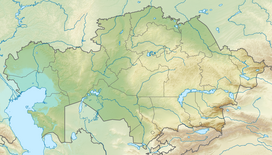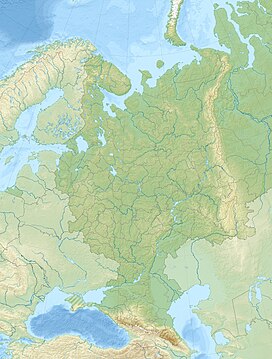Mugalzhar

| Mugalzhar | |
|---|---|
| Мұғалжар / Мугоджары | |
 Birch grove in the Mugalzhar | |
| Highest point | |
| Peak | Ulken Baktybay |
| Elevation | 657 m (2,156 ft) |
| Coordinates | 48°38′38″N 58°32′47″E / 48.64389°N 58.54639°E |
| Dimensions | |
| Length | 200 km (120 mi) N/S |
| Width | 30 km (19 mi) E/W |
| Geography | |
| Location | Kazakhstan |
| Range coordinates | 48°39′N 58°33′E / 48.650°N 58.550°E |
| Geology | |
| Rock age(s) | Precambrian, Paleozoic |
| Rock type(s) | Sandstone, conglomerate, quartzite, schist, gneiss, granite, shale |
Mugalzhar (Kazakh: Мұғалжар), also known as Mugodzhar Hills or Mugodzhar Range (Russian: Мугоджары),[1] is a mountain range of moderate height in the Aktobe Region of northwestern Kazakhstan.
Geography
[edit]Stretching in a roughly north/south direction, the Mugalzhar is a southern prolongation of the Ural Mountains. The northernmost section a narrow ridge that branches into two almost parallel ridges separated by the gently undulating 20 kilometers (12 mi) Alabass Basin (Russian: Алабасская котловина).[2]
The Mugalzhar has a length of about 200 kilometers (120 mi) with a width of 30 kilometers (19 mi). It stretches from the Or River (река Орь) as a narrow range that further south splits in two: the Eastern Mugalzhar and Western Mugalzhar. The highest point is 657 meters (2,156 ft) high Mount Ulken Baktybay (Boktybay), rising in the Eastern Mugalzhar.[3][4][5]
Located at the southern end, the Shoshkakol Buirat is a spur of low hills reaching a height of 408 meters (1,339 ft).[4] In the northern section, the wider Mugalzhar connects with the Guberlin Mountains.[3]
Hydrography
[edit]The Mugalzhar forms the divide between the Caspian and Aral Sea basins.[2] Some of the rivers having their sources in the Mugalzhar are Or, Emba, Irgiz, Zhylandysay, Bolgasyn and Kauylzhyr.[4][3]
References
[edit]- ^ Gory Mugodzhary Geonames
- ^ a b "Мугоджары". Great Soviet Encyclopedia.
- ^ a b c "M-40 Topographic Chart (in Russian)". Retrieved 9 January 2024.
- ^ a b c "L-40 Topographic Chart (in Russian)". Retrieved 9 January 2024.
- ^ Google Earth
External links
[edit] Media related to Mugodzhar Hills at Wikimedia Commons
Media related to Mugodzhar Hills at Wikimedia Commons

